One can easily argue the duplicity of people when it comes to the value of being smart.
There are many definitions of smart. Some relate to specific metrics (IQ) while others place the emphasis on matters that are harder to measure (street smarts, political smarts, corporate smarts). Therefore, before going too far, I should define smart, and do so in a very self-serving manner.
Smart (intelligent) – a person who is aware of the limits of both his knowledge and abilities and in that awareness, constantly seeks to expand said limits in all manner of disciplines, each prioritized based on the person’s current needs and desires.
By the above definition, I am smart. No surprise there; the person making the rules always does well. Practically speaking, being smart gives me confidence in myself and my decisions, confidence in my ability to solve problems, confidence in my ability to recognize when I don’t know something and to seek help. Confidence in taking risks and learning from failure.
Before I go on, Yellowstone 2015, Mammoth Hot Springs. Nothing to do with the above; just thoughts on photography and Yellowstone.


All these photos are from our 2013 and 2015 trips to Yellowstone. Click on them for a larger version. Go to the SmugMug Gallery for the full-size 2015 versions. The photos for the 2013 Yellowstone shots are in THIS SmugMug gallery.
The above cone is called Liberty Cap. It was shot pretty much in the mid-day sun, slightly diffused by wispy clouds. Contrast the above photos with these two, shot in 2013 but earlier in the day (around 8:30 am).
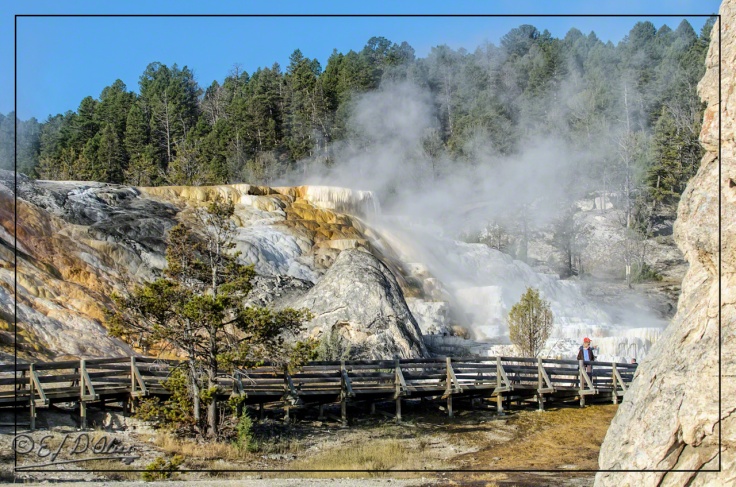
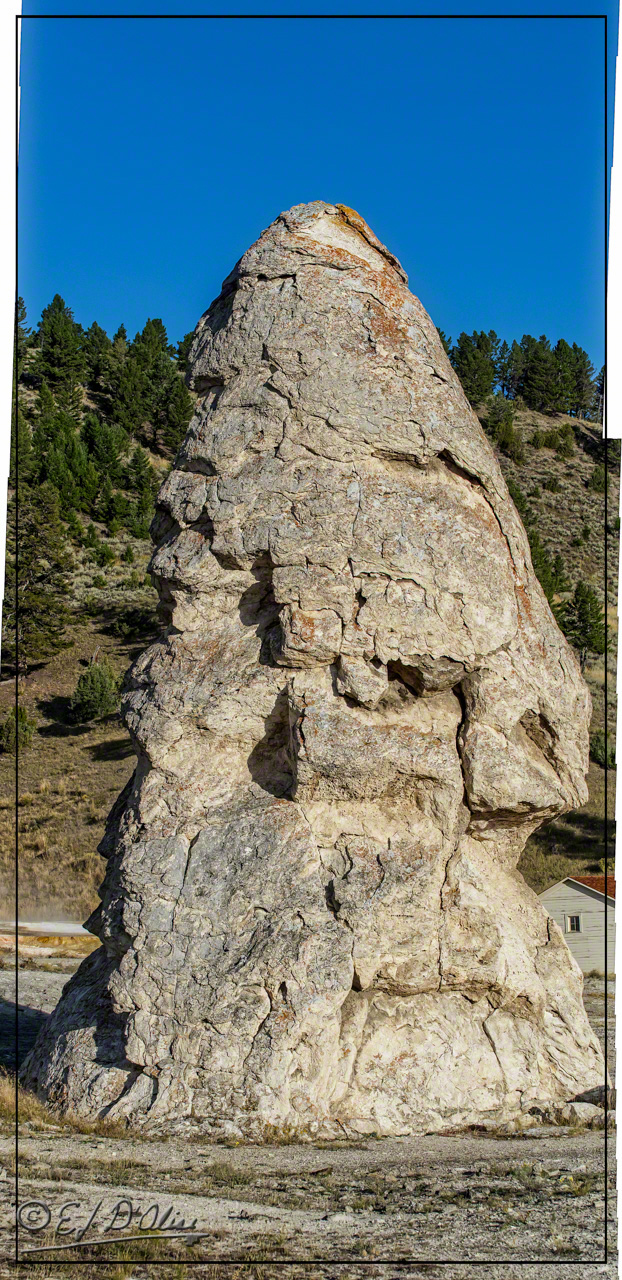
Same camera, same lenses, different light. I mentioned before that, contrary to what some might think, I don’t play around much with the photos beyond basic adjustments. When I do, it’s pretty obvious as it’s always over-the-top.
I might be able to tweak the 2015 photos to give them a look similar to the 2013 photos, but I doubt I could come close to having the sun low in the sky and casting sideways shadows.
I’m not smart enough . . . photoshop-smart enough, that is.
So, why did I bring up being smart and mention ‘duplicity’ in the opening sentence? Well, let me tell you. I read THIS piece. And, that piece got me thinking and remembering THIS piece I wrote about the show Eureka.
We live in a society where you can hear both a celebration of intellect and scoffing at the same. Actually, “celebration” is too strong a word while “scoffing” might not be strong enough.
Let’s do more comparisons between diffuse light and strong light . . .



I do like the above photos. Even as I processed them, I admired their details.
And then, I went back to 2013 . . .



I don’t know about you, my dear readers, but I can’t help but rate the 2013 photos as ‘better’. And, yes . . . same camera, same lenses, same processing.
There is one other thing which has nothing to do with the lighting or equipment. Mammoth Hot Springs is a dynamic area. Things changed in the two years separating the two sets of photos. In 2015, there were fewer terraces, less water, less pools . . . less overall details.


But, make no mistake . . . the lighting helps. It helps a lot.
Being smart, on the other hand, is a mixed bag. It certainly helps achieve success (not a given; it still requires working at it). I believe it can also help in becoming a high-functioning human being. That’s not a universal thing. Sometimes being smart actually hinders the progress toward becoming high-functioning.
What do people mean by high-functioning? I mean a person who’s at ease in and out of their environment. A person with social aptitude, empathy, compassion, emotional intelligence, and adaptable to a variety of situations. On a personal level, I’ll add a few traits of my own: not taking things too seriously and not over-relying in the opinion of others.
Also on a personal level, I equate rationality with being smart. I credit the ability to question with embarking someone on the path to rationality, and the ability to question requires a broad awareness and understanding in addition to the curiosity driving one to learn more about the world we inhabit.
Understand, rationality should not be devoid of empathy, of compassion, of consideration for others. When I speak of rationality, I refer to its application toward explaining the world to me. Paradoxically, one cannot strictly rely on rationality . . . we are not machines, after all. I like Nutella, especially on Italian or French bread. There is no rational reason for doing so . . . I just do.
In contrast to the above 2013 photos, I offer you these from 2015.


As I said, I like these as well, but they are leaning toward a high key look.
You can mitigate that lack of contrast and narrow dynamic range by getting closer, or zooming in.



Even so, if you look at the next photo, you still get that loss of drama in the well-lit areas.

Hey, how about a vertical panorama?

Can you find the bird in the above and this next shot (not a difficult task)?

These next closeups do show a lot of detail and a surprising amount of texture.


I did not see as much of the terraced features in 2015. They were some, but not as expansive as can be seen in this next 2013 photo.

Being smart hinders you in the human interaction department. In the presence of ‘smart’, many people fall into the range from being uncomfortable to outright hostile. Various hypothesis offer explanations for that range of reactions, but I like the notion of the ‘level playing field’.
There is an unspoken power dynamic that is at work whenever people encounter each other. Not everyone, but many people will automatically rank themselves relative to people they interact with. They might be dismissive if the other person is perceived as being of a lower social or economic class, or they might be deferential if dealing with a person perceived as belonging to a higher social or economic class. The interaction between people at roughly the same level is deemed optimal, improving the chances of becoming friends, because of shared experiences and the like. That also applies to the notion of intellect.
It’s not all that clear-cut, of course. Mixed in there are envy, resentment, contempt, and so on. Some people border on hating people outside their own strata. Also mixed in there is the propensity to assume others as either smarter or not as smart as they actually are. People more often than not lean more toward the ‘not as smart’ when it comes to others, allowing them to open the gates of friendship. Mind you, not dumb. No one wants dumb friends, but I’m betting most people believe they hold a slight edge over their friends. The friends believe they hold a slight edge over you, and everyone is happy not talking about it.
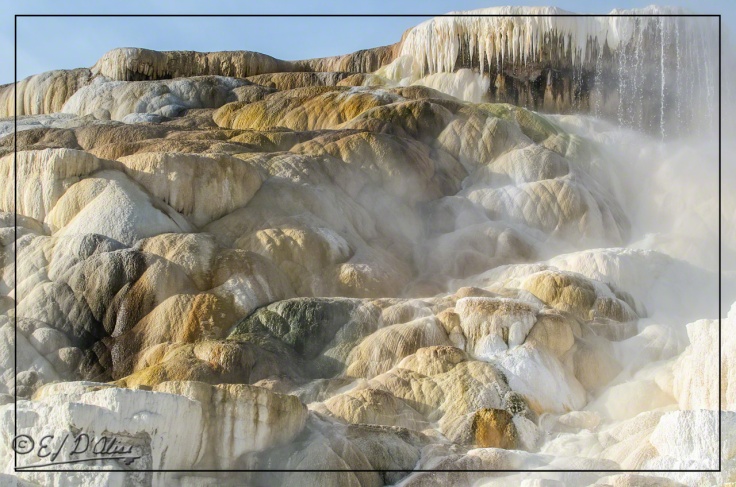


Notice this feature? It was featured (get it, feature . . . featured . . . nevermind) in one of my now-defunct monthly calendars offerings.
Well, two years later . . . .



Yes, that last one is a six-photos panorama. Here is a twelve-photo panorama. The original was fifteen shots, but SmugMug has a pixel limit for photographs, so I had to cut it down.

Probably my favorite panorama from this set is this next one . . .
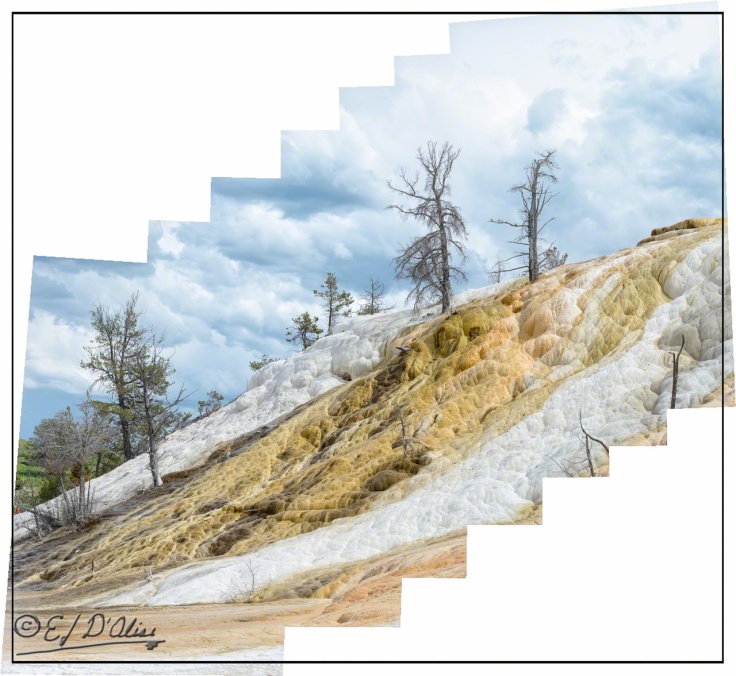
There is a bit of similarity between “smart” and “rich” insomuch that both qualities set you apart from most people.
Side note: I’m often amused when I hear people speak of winning the lottery. Perhaps they don’t care, figuring the money is enough, but they would instantly be thrown out of their circle of friends. The scales would shift, you see . . . if you win the lotto, your fears, concerns, preoccupations, attitudes, interests, and life itself instantly cease to have anything in common with the people around you. They and you no longer sit on the same strata.
The difference being that people think they might one day be rich, so they are more prone to admire if not outright respect financially successful people (not a universal thing, but given the pervasive celebrity cult in this country as well as the popularity of talent shows, it’s a fair generalization).
Not so intellect.
Admit it . . . when, in the opening, I flat out said I was smart, you felt an instant . . . I want to say repulsion, but it’s probably more like a challenge. Note that I said nothing about you or anyone else. I just said I was smart and made no statement regarding others. I even heavily qualified my “smarts”, but it doesn’t matter; the word carries baggage.
Enough baggage that our first reaction is to dismiss it: “Says you!” we answer.
The other reaction is to immediately scrutinize everything the person does and says. Any stumble, honest mistake, or innocent gaffe is sufficient for the eventual “Not so smart now, are you?” Most people take more pleasure from seeing a smart person falter than a rich person lose their money. I think people don’t feel as threatened, personally threatened, by rich people as they do by smart people. Certainly, politicians and religious leaders have no use for smart people.
Side note: based on interaction with my readers, the vast majority of you rank up there in the intellect department. I’m not just saying that and before you put yourself down by denying it, stop. There is nothing wrong with being smart. Own it.
Here are a few more “before and after” shots . . .




So, that’s the one-on-one reaction to the perceived challenge of a claim to intelligence, but I think it’s rooted in the anti-intellectualism that permeates society. Why the antipathy? Why the dismissal?
Here too, I have a hunch. Actually, more than a hunch.
Belief in a god – 75%
Belief in ghosts – 50%
Belief in UFO/Aliens in the past and currently visiting Earth – 40%
Belief in Astrology – >50%
Belief in Creation view of Human Origins – 42%
The Law of Attraction, The Secret, the Conscious Universe, Magic, Energy Lines, Auras, Chi, Life Force, Fortune Telling, Speaking to the Dead (channeling past lives), Reincarnation, Eternal Life, Homeopathy, Prayers, Luck . . . the list goes on and on.
All of those are deeply and dearly held beliefs without a shred of proof for any of them. That’s not to say believers are not smart; many of them are smart . . . in everything but their particular belief.
When other smart people challenge those beliefs, the holders of beliefs anchored only by wishful thinking — no proof, no evidence, not a shred of logic — have only one recourse: denigrate those who refute or question them.
It’s understandable . . . children cry the moment they lose their grip on the hem of their mother’s skirt and have to stand on their own two feet.
Some might react negatively to that metaphor. I can’t say “sorry” when I’m not.
The last two shots from 2015 before I finish with a few more 2013 shots.
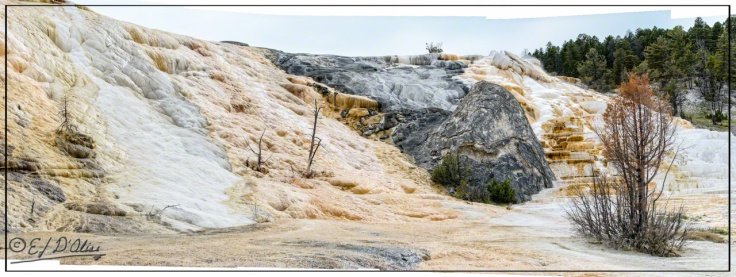
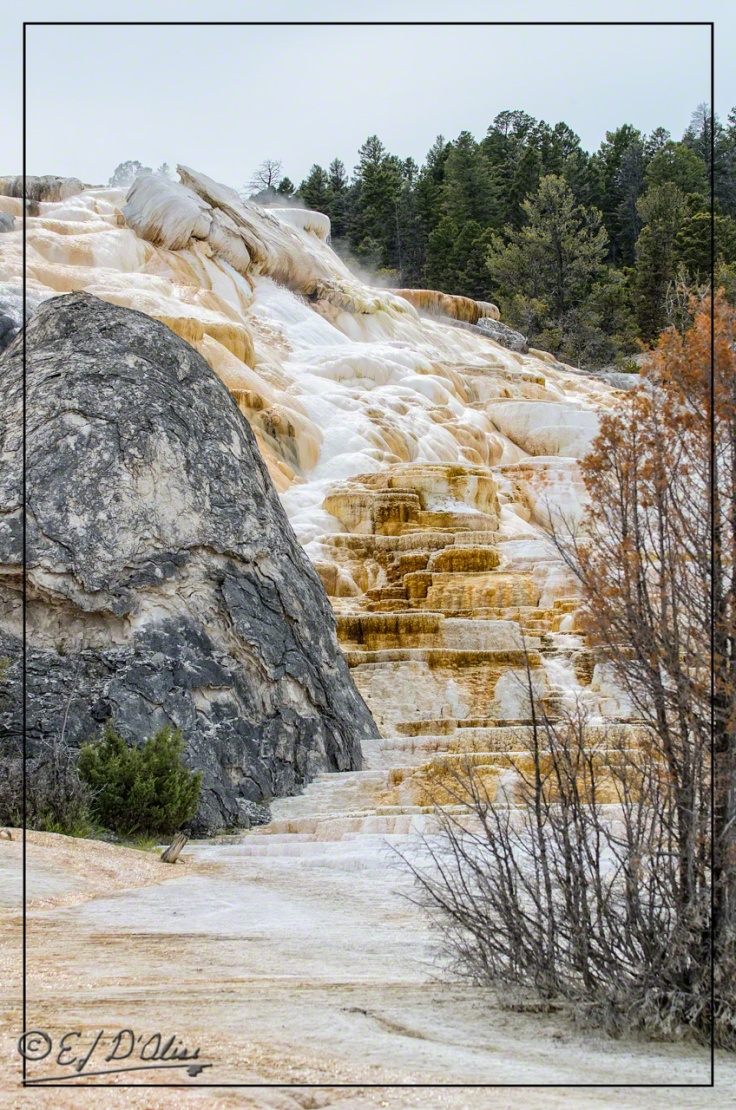
Here is a similar shot from 2013.
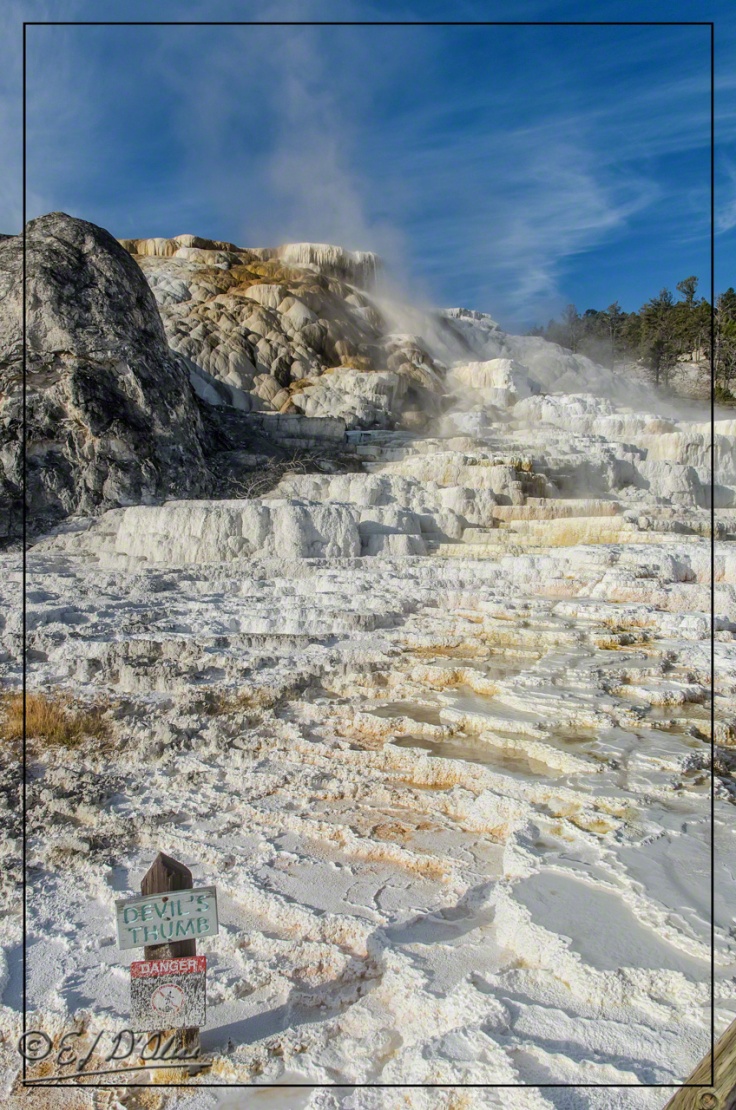
What’s the most common response one gets when asking for proof, pointing out fallacies, and/or attempting to discuss any of those beliefs?
“You don’t know everything!”
“Science doesn’t have all the answers!”
“Look how often scientists have been wrong in the past!”
. . . and, of course, the ubiquitous “You think you’re so smart!”
Of course, THIS doesn’t help any. Kind of makes me a tad concerned, but not, apparently half of the US population.
As much as people accept and bow to the superiority of learned individuals when it comes to doing surgery, designing cars, flying airplanes, and building rockets, they balk when it comes to cherished beliefs. That is, in part, why we have veritable idiots both running for office and already elected. That’s also why it’s so easy to fool believers . . . you reinforce what they already believe and steer them away from doubt.
Let’s take that last shot and play with some B&W conversions (my favorite is last one) . . .




I should mention there are pitfalls with being smart . . . smart people are better at rationalizing their own bad thinking and bad behavior, emphasis on the “their” — they have no problem seeing the faulty logic in the thinking of others.
If they don’t constantly self-question, the very ability of smart people to adapt and solve problems allows them to come up with plausible arguments in favor of whatever they want to believe; smart people are better at rationalizing wrong beliefs precisely because they know more.
The important thing to take away from this are the words “want to”.
It’s not a guarantee against bad thinking and self-deception, but that’s why I emphasize questioning your own beliefs (smart or not). Not once, but often. Do research. Read that counterargument. Watch a debate between those who believe like you and those who think you are wrong. Listen to the other side; it will make you smarter and lessen the chance you are fooling yourself.
I don’t see this happen often enough. Perhaps, then, this is another reason for the antipathy toward intellect. Smart people are often cocksure they are right. It annoys those of us who actually are right. Yes, that’s a joke.
Here are a few more shots from 2013 . . .



There’s one more thing smart people appear to have in common. If you accept the statement that I am smart, then I’m a data point in favor of this final trait.
Smart people do not appear to have as much of a need for friends (both the show and actual friends). They do fine on their own. You can read about it HERE, but I’ll quote from the abstract:
“More importantly, the main associations of life satisfaction with population density and socialization with friends significantly interact with intelligence, and, in the latter case, the main association is reversed among the extremely intelligent. More intelligent individuals experience lower life satisfaction with more frequent socialization with friends.”
Wow . . . did you read that? With as few friends as I have, I can only conclude not only that I am smart, but extremely smart.

Additional reading:
After writing this piece, I got curious (imagine that!) and looked for other articles on the subject of ‘smart’ (they use ‘intelligent’ . . . I think it means close to the same thing).
This piece HERE offers a more personal account of the problem with being smart. Perhaps more humorous, as well.
This piece HERE highlights the downside of being smart.
This piece HERE offers up more problems with being smart.
This piece HERE touches on the traits of smart people.
This piece HERE deflated my ego . . . not tall, not thin, no music lessons, not left-handed, did not do drugs, and at one time smoked.
That’s it. This post has ended . . . except for the stuff below.
<><><><><><><><o><><><><><><><><><o><><><><><><><>
Note: if you are not reading this blog post at DisperserTracks.com, know that it has been copied without permission, and likely is being used by someone with nefarious intention, like attracting you to a malware-infested website. Could be they also torture small mammals.
<><><><><><><><o><><><><><><><><><o><><><><><><><>
Please, if you are considering bestowing me recognition beyond commenting below, refrain from doing so. I will decline blogger-to-blogger awards. I appreciate the intent behind it, but I prefer a comment thanking me for turning you away from a life of crime, religion, or making you a better person in some other way. That would mean something to me.
If you wish to know more, please read below.
About awards: Blogger Awards
About “likes”: Of “Likes”, Subscriptions, and Stuff
Note: to those who may click on “like”, or rate the post; if you do not hear from me, know that I am sincerely appreciative, and I thank you for noticing what I do.
. . . my FP ward . . . chieken shit.
“The difference being that people think they might one day be rich, so they are more prone to admire if not outright respect financially successful people (not a universal thing, but given the pervasive celebrity cult in this country as well as the popularity of talent shows, it’s a fair generalization)”
Obviously this is a reference to donald trumps followers/ desciples
(trust my cutting/pasting that from the above essay doesn’t infringe your copyright)
I know you like sticking your pictures in but I think you went a bit overboard this time, took away something which I thought was a good stand alone essay.
LikeLike
No copyright infringement if you are copy/pasting here.
As for the reference, not only Donald Trump followers. The whole of society defers to both power and money, and more so when the two combine.
As for the photos interfering with the writing . . . here you go (I can cut and past as well as the next guy, although I don’t think it’s as easy a read):
One can easily argue the duplicity of people when it comes to the value of being smart.
There are many definitions of smart. Some relate to specific metrics (IQ) while others place the emphasis on matters that are harder to measure (street smarts, political smarts, corporate smarts). Therefore, before going too far, I should define smart, and do so in a very self-serving manner.
Smart (intelligent) – a person who is aware of the limits of both his knowledge and abilities and in that awareness, constantly seeks to expand said limits in all manner of disciplines, each prioritized based on the person’s current needs and desires.
By the above definition, I am smart. No surprise there; the person making the rules always does well. Practically speaking, being smart gives me confidence in myself and my decisions, confidence in my ability to solve problems, confidence in my ability to recognize when I don’t know something and to seek help. Confidence in taking risks and learning from failure.
So, why did I bring up being smart and mention ‘duplicity’ in the opening sentence? Well, let me tell you. I read THIS piece. And, that piece got me thinking and remembering THIS piece I wrote about the show Eureka.
We live in a society where you can hear both a celebration of intellect and scoffing at the same. Actually, “celebration” is too strong a word while “scoffing” might not be strong enough.
Being smart, on the other hand, is a mixed bag. It certainly helps achieve success (not a given; it still requires working at it). I believe it can also help in becoming a high-functioning human being. That’s not a universal thing. Sometimes being smart actually hinders the progress toward becoming high-functioning.
What do I mean by high-functioning? I mean a person who’s at ease in and out of their environment. A person with social aptitude, empathy, compassion, emotional intelligence, and adaptable to a variety of situations. On a personal level, I’ll add a few traits of my own: not taking things too seriously and not over-relying in the opinion of others.
Also on a personal level, I equate rationality with being smart. I credit the ability to question with embarking someone on the path to rationality, and the ability to question requires a broad awareness and understanding in addition to the curiosity driving one to learn more about the world we inhabit.
Understand, rationality should not be devoid of empathy, of compassion, of consideration for others. When I speak of rationality, I refer to its application toward explaining the world to me. Paradoxically, one cannot strictly rely on rationality . . . we are not machines, after all. I like Nutella, especially on Italian or French bread. There is no rational reason for doing so . . . I just do.
Being smart hinders you in the human interaction department. In the presence of ‘smart’, many people fall into the range from being uncomfortable to outright hostile. Various hypothesis offer explanations for that range of reactions, but I like the notion of the ‘level playing field’.
There is an unspoken power dynamic that is at work whenever people encounter each other. Not everyone, but many people will automatically rank themselves relative to people they interact with. They might be dismissive if the other person is perceived as being of a lower social or economic class, or they might be deferential if dealing with a person perceived as belonging to a higher social or economic class. The interaction between people at roughly the same level is deemed optimal, improving the chances of becoming friends, because of shared experiences and the like. That also applies to the notion of intellect.
It’s not all that clear-cut, of course. Mixed in there are envy, resentment, contempt, and so on. Some people border on hating people outside their own strata. Also mixed in there is the propensity to assume others as either smarter or not as smart as they actually are. People more often than not lean more toward the ‘not as smart’ when it comes to others, allowing them to open the gates of friendship. Mind you, not dumb. No one wants dumb friends, but I’m betting most people believe they hold a slight edge over their friends. The friends believe they hold a slight edge over you, and everyone is happy not talking about it.
There is a bit of similarity between “smart” and “rich” insomuch that both qualities set you apart from most people.
Side note: I’m often amused when I hear people speak of winning the lottery. Perhaps they don’t care, figuring the money is enough, but they would instantly be thrown out of their circle of friends. The scales would shift, you see . . . if you win the lotto, your fears, concerns, preoccupations, attitudes, interests, and life itself instantly cease to have anything in common with the people around you. They and you no longer sit on the same strata.
The difference being that people think they might one day be rich, so they are more prone to admire if not outright respect financially successful people (not a universal thing, but given the pervasive celebrity cult in this country as well as the popularity of talent shows, it’s a fair generalization).
Not so intellect.
Admit it . . . when, in the opening, I flat out said I was smart, you felt an instant . . . I want to say repulsion, but it’s probably more of like a challenge. Note that I said nothing about you or anyone else. I just said I was smart and made no statement regarding others. I even heavily qualified my “smarts”, but it doesn’t matter; the word carries baggage.
Enough baggage that our first reaction is to dismiss it: “Says you!” we answer.
The other reaction is to immediately scrutinize everything the person does and says. Any stumble, honest mistake, or innocent gaffe is sufficient for the eventual “Not so smart now, are you?” Most people take more pleasure from seeing a smart person falter than a rich person lose their money. I think people don’t feel as threatened, personally threatened, by rich people as they do by smart people. Certainly, politicians and religious leaders have no use for smart people.
Side note: based on interaction with my readers, the vast majority of you rank up there in the intellect department. I’m not just saying that and before you put yourself down by denying it, stop. There is nothing wrong with being smart. Own it.
So, that’s the one-on-one reaction to the perceived challenge of a claim to intelligence, but I think it’s rooted in the anti-intellectualism that permeates society. Why the antipathy? Why the dismissal?
Here too, I have a hunch. Actually, more than a hunch.
Belief in a god – 75%
Belief in ghosts – 50%
Belief in UFO/Aliens in the past and currently visiting Earth – 40%
Belief in Astrology – >50%
Belief in Creation view of Human Origins – 42%
The Law of Attraction, The Secret, the Conscious Universe, Magic, Energy Lines, Auras, Chi, Life Force, Fortune Telling, Speaking to the Dead (channeling past lives), Reincarnation, Eternal Life, Homeopathy, Prayers, Luck . . . the list goes on and on.
All of those are deeply and dearly held beliefs without a shred of proof for any of them. That’s not to say believers are not smart; many of them are smart . . . in everything but their particular belief.
When other smart people challenge those beliefs, the holders of beliefs anchored only by wishful thinking — no proof, no evidence, not a shred of logic — have only one recourse: denigrate those who refute or question them.
It’s understandable . . . children cry the moment they lose their grip on the hem of their mother’s skirt and have to stand on their own two feet.
Some might react negatively to that metaphor. I can’t say “sorry” when I’m not.
What’s the most common response one gets when asking for proof, pointing out fallacies, and/or attempting to discuss any of those beliefs?
“You don’t know everything!”
“Science doesn’t have all the answers!”
“Look how often scientists have been wrong in the past!”
. . . and, of course, the ubiquitous “You think you’re so smart!”
Of course, THIS doesn’t help any. Kind of makes me a tad concerned, but not, apparently half of the US population.
As much as people accept and bow to the superiority of learned individuals when it comes to doing surgery, designing cars, flying airplanes, and building rockets, they balk when it comes to cherished beliefs. That is, in part, why we have veritable idiots both running for office and already elected. That’s also why it’s so easy to fool believers . . . you reinforce what they already believe and steer them away from doubt.
I should mention there are pitfalls with being smart . . . smart people are better at rationalizing their own bad thinking and bad behavior, emphasis on the “their” — they have no problem seeing the faulty logic in the thinking of others.
If they don’t constantly self-question, the very ability of smart people to adapt and solve problems allows them to come up with plausible arguments in favor of whatever they want to believe; smart people are better at rationalizing wrong beliefs precisely because they know more.
The important thing to take away from this are the words “want to”.
It’s not a guarantee against bad thinking and self-deception, but that’s why I emphasize questioning your own beliefs (smart or not). Not once, but often. Do research. Read that counterargument. Watch a debate between those who believe like you and those who think you are wrong. Listen to the other side; it will make you smarter and lessen the chance you are fooling yourself.
I don’t see this happen often enough. Perhaps, then, this is another reason for the antipathy toward intellect. Smart people are often cocksure they are right. It annoys those of us who actually are right. Yes, that’s a joke.
There’s one more thing smart people appear to have in common. If you accept the statement that I am smart, then I’m a data point in favor of this final trait.
Smart people do not appear to have as much of a need for friends (both the show and actual friends). They do fine on their own. You can read about it HERE, but I’ll quote from the abstract:
“More importantly, the main associations of life satisfaction with population density and socialization with friends significantly interact with intelligence, and, in the latter case, the main association is reversed among the extremely intelligent. More intelligent individuals experience lower life satisfaction with more frequent socialization with friends.”
Wow . . . did you read that? With as few friends as I have, I can only conclude not only that I am smart, but extremely smart.
LikeLike
Smart-Ass! M 🙂
LikeLiked by 1 person
It’s actually the totality of me, and not just particular anatomical areas.
LikeLiked by 1 person
Yes, 2013 was a very good year. But 2015 was not too shabby, either. I like the B&W treatments, too.
LikeLike
. . . as I knew you would. Thanks.
LikeLike
You would like Iceland, gun laws and geezers, lots to like. My problem is that I sometimes think that I’m smarter than I am, so I keep reading your blog to remind myself what smart really is!
LikeLike
I did look into Iceland. Like many places, big restriction on who can live there.
As for the rest . . . if you say so. I can partially agree with you because that is precisely why I read my own blog. I am enamored with the lucidity of thought and reasoning I find in these posts and amazed that with little or no effort I seem to comprehend and agree with everything I read here.
LikeLike
Hi Emilio
Love the b&w photos especially, they got an instant positive reaction from me, which was good as I was feeling a bit miffed about the list of stupid things that such a lot of people believe in. I loved your analogy of the child, it’s how I see belief in a god, because really, apart from psychopaths and sociopaths, who needs a list of commandments to tell you how to behave well? Aliens on the earth is just an extension of the god concept – looking for someone else to lead\take the blame, rather than face up to life yourself. I believe there is\has been life on other planets, but if it’s ever evolved to space-faring levels, the chances of it ever coming to earth are so vanishingly small, given the distance and time involved. But I would love it, if it ever happened – but I’m smart enough to realise it won’t.
No false modesty, by your definition, and other standard definitions, I am smart: I have obtained a certain level of education and have a job that fits those criteria, often, like the lady in one of your examples, with little or no effort on my part. But I am smart only in some areas: I know to some other people I am basically an ignoramus when it comes to things like maths and physics. And here is where I struggle when meeting people socially who are not perhaps as smart ( I’m feeling very uncomfortable with this, it feels rude and snobbish). Because, even though I’m not good at the sciences, I’m still wildly curious and read and watch everything I can to try and understand, but so many people don’t seem to have any curiosity about the world, themselves, other people, etc. And it’s that lack of curiosity that worries me: I don’t understand it. And I don’t mean just lack of curiosity about so-called academic subjects, I mean lack of curiosity about anything.
LikeLiked by 1 person
What do you mean “it won’t”? That is my only hope, short of dying, of escaping the mess I see developing. We always have a bag packed in case I can convince a kind passing alien to take us off this rock.
No, wait . . . that’s in case of fires or other natural disasters. Still, aliens, if you’re out there and reading this, I’ll work for our passage. Got my bags packed, and everything.
You touch on a subject I left out. Curiosity. I think this might be tied to reading, but it’s a bit like the chicken and the egg question. Do people read because they are curious or are people curious because they read?
One of the things I always remember (but can’t remember where I first heard it) is the analogy of knowledge as a candle in the dark. Yes, that is a common theme, but that’s not what I mean. What I remember is the idea that as the brightness of the flame grows, the circumference of the boundary between light and dark also grows.
As it does, there is a transition from ignorance (the dark) to the beginning of understanding (the transition between light and dark) to knowledge (the area that is fully illuminated). But as much as we learn and understand, as much as that circumference grows – we realize just how much more there is to learn. So much that no lifetime is ever enough.
The other thing with that analogy is that some people actively resist that expanding knowledge, always pointing to imagined things beyond the boundary in support of their nonsensical and self-serving ideas. Hence the “god of the gaps” in religion and “quantum this or that” in various new-age thinking.
So yes . . . no curiosity, no growth, no understanding, no wonder of discovery. Without curiosity, all we have is the stagnant swamp of superstition and the false comfort of lies.
LikeLike
I don’t know, but suspect from some observation, that if you are not curious you don’t read. And that’s another thing that astonishes me, the amount of people who tell me, with pride, they don’t read books. As if it is an accomplishment. Incredible.
LikeLiked by 1 person
I wrote several remarks on the “smarts” essay, but they didn’t sound smart enough so I deleted them (meaning that I wasn’t satisfied with them). Instead I’ll comment on your very beautiful photos. I’ve been studying abstract art recently and found a painting method that seems very doable to me. I’m so looking forward to actually trying it out and these photos are a font of ideas and inspiration. The texture and colors are delicious!!!
LikeLike
Not sure what smart enough means. Perhaps you mean confident. As for satisfied, I’ll let you in on a secret . . . if I waited until I was satisfied with stuff before posting it, this blog would be empty.
At most, I’m sufficiently satisfied, and even then, I realize that a week, a year, ten years from now, everything I write now will seem not as good to my older self . . . unless I start going senile, in which case what I am writing now will then seem to me like pure genius.
LikeLike
Smart enough to make it worth posting and make sense. Sometimes I can’t find the right words to express what I feel and I don’t want to wait for inspiration to kick in.
LikeLike
Your photos are phenomenal! Such amazing colors and textures! I feel like I am right there!
I have some very intelligent relatives. I like to tease them. But, I admire them, too. They understand things that I never will. (Although I did get mostly “A”‘s and the rest “B”‘s in college and grad school, I don’t consider myself smart. A smart-ass, yes. 😉 😀 😛 )
The older I get the less I think I know.
I love the Far Side cartoon about the Mid-Vale School For the Gifted. I pull on a lot of push doors and push on a lot of pull doors.
Hope you had a great weekend!
HUGS!!! 🙂
LikeLike
Thank you. That’s very nice of you to say.
And, yes, that’s a great cartoon. As for being smart, if a sense of humor is an indicator, you have nothing to worry about.
We had a snowy, but good, weekend. Hope yours was nice as well, and that your sinuses finally cleared up.
LikeLiked by 1 person
You’re welcome!
Thank you!
And my sinus crud is much better!
LikeLiked by 1 person
PS…as for the great links you shared…according to the “traits of smart people”…I am smart. According to the last link, I must be an idiot! 😀
LikeLike
That was my thinking exactly . . . er . . . about me, not you.
LikeLiked by 1 person